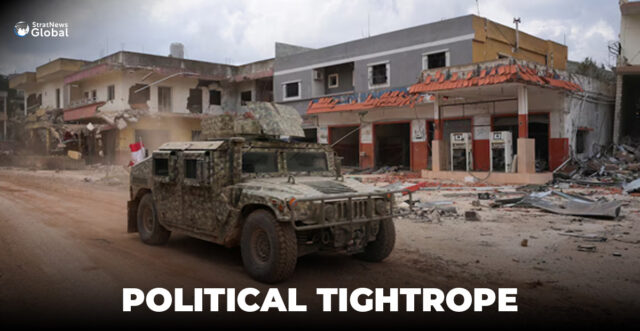Lebanon’s army has demolished so many Hezbollah weapons depots that it has depleted its own explosives supply, as it races to meet a year-end deadline to disarm the Shi’ite group in the south under a ceasefire deal with Israel, two sources told Reuters.
The explosives shortage, which has not been previously reported, has not stopped the army from quickening the pace of inspection missions to search for hidden weapons in the south, near Israel, the two said, one of whom is a security source and the other a Lebanese official.
It would have been unimaginable for Lebanon’s military to embark on such a task at the zenith of Iran-backed Hezbollah’s power just a few years ago, and many observers were sceptical even after the ceasefire agreement.
But Hezbollah was hit hard by Israel’s war last year, which killed thousands of fighters and the upper echelons of both the military and political wings, including leader Hassan Nasrallah. The war also killed more than 1,100 women and children and destroyed swathes of Lebanon’s south and east.
The U.S. has kept up pressure on Lebanon to disarm Hezbollah, which is designated a terrorist group by Washington. President Donald Trump’s deputy Middle East envoy, Morgan Ortagus, is in Beirut this week to discuss momentum on disarmament with Lebanese officials.
As they wait for U.S. deliveries of explosive charges and other military equipment, Lebanese troops are now sealing off sites they find instead of destroying them, said one of the sources and two other people briefed on the army’s recent activities.
Their searches yielded nine new arms caches in September, the two other briefed officials said. The security source said dozens of tunnels used by Hezbollah had also been sealed and more soldiers were being steadily recruited to deploy to the south.
Reuters spoke to 10 people, including Lebanese officials, security sources, diplomats and a Hezbollah official, all of whom said the army expects to complete its sweep of the south by the year’s end.
Meeting the deadline would be a considerable feat for an institution once unable or unwilling to stop Hezbollah rebuilding a military presence near Israel after a previous war in 2006 – and for a country in which Hezbollah was once the dominant political force.
Army Steps Cautiously Elsewhere In Lebanon
Progress in the rest of the country looks far less certain.
Despite its advances, the army wants to avoid inflaming tensions and to buy time for Lebanon’s politicians to reach a consensus about the group’s arsenal in other parts of the country, a second Lebanese official who is close to Hezbollah and two security sources said.
It has not published images of the work destroying weapons caches, or even said the weapons belong to Hezbollah.
Under the November 2024 ceasefire that ended more than a year of hostilities between Israel and Hezbollah, Lebanon agreed that only state security forces should bear arms in the country. That would mean fully disarming Hezbollah.
Hezbollah has publicly committed to the ceasefire but is not a formal signatory. It insists that the disarmament, as mentioned in the text, only applies to the south of Lebanon.
On September 5, the cabinet adopted a more detailed five-phase plan for imposing the state monopoly on arms – starting in the south and gradually moving north and east, the security sources and the second Lebanese official said.
The army said it would clear the south by December, without committing to a timeline for the rest of the country. The government has said the plan is contingent on Israel halting air strikes that have continued despite the ceasefire. All the sources said the army would have to navigate treacherous political terrain to achieve full disarmament.
Ed Gabriel, who heads Washington-based non-profit the American Task Force Lebanon and met with Lebanon’s military and political leaders in October, said the army’s cautious approach reflected the possibility of civilian strife if it moved too fast outside of the south.
“It’s a Lebanese answer to disarmament,” he said.
Hezbollah has not opposed the seizures of unmanned weapons caches in the south and has not fired on Israel since the November truce. However, it has publicly refused to relinquish its weapons elsewhere, hinting that conflict was possible if the state moved against the group.
Moving north and east without a political consensus risks confrontation with Hezbollah fighters or street protests by Lebanon’s Shi’ite community, among whom Hezbollah remains popular, the two security sources and the second Lebanese official said.
In a written statement to Reuters, Hezbollah’s media office said the ceasefire meant Lebanon’s army was fully responsible for the zone south of the Litani River, referring to the water body that crosses southern Lebanon near Israel.
But any disarmament efforts north of the river would require political consensus, it said.
“The rest – that depends on a political settlement, which we don’t yet have. The army is betting on time,” said a Lebanese official close to the group.
The army still fears a stand-off with Hezbollah’s constituency could again fracture the army, which split during Lebanon’s 15-year civil war, one Lebanese official told Reuters.
In a speech on Sunday, Hezbollah secretary general Naim Qassem described the army’s approach as good and balanced but also issued a warning, saying he hoped the army was not considering clashing with the Shi’ite community.
The media offices of the Lebanese army, cabinet and presidency did not respond to questions from Reuters for this story. The Israeli military did not respond to requests for comment.
(With inputs from Reuters)





